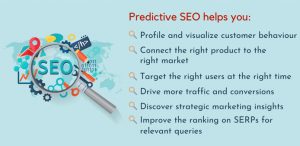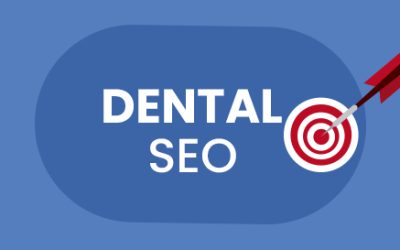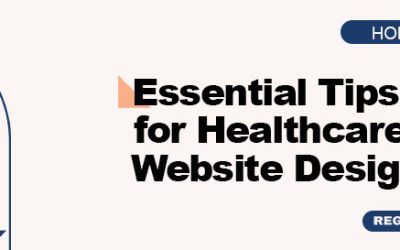Predictive SEO means planning and updating content that will become popular in future. In other words, you predict and provide the content or information that consumers will be looking for in the future before competitors catch up. Predictive SEO is used in many organizations for decision-making purposes. For instance, using SEO for healthcare marketing is essential to provide information easily to people who search for medical information online. A healthcare SEO company can help medical professionals use predictive SEO in healthcare marketing.
Predictive SEO techniques that content marketers use include: asking the right questions, looking to the past, recording and analyzing trending traffic, etc to create great content that will be in demand in the future. By optimizing old content and planning new content, you can retain/improve traffic to your site. Using predictive SEO can help you capture a higher rank in SERPs.
With the help of predictive analysis tools, content management teams and SEO specialists select topics and content to optimize old content and plan new content.

Finding the content to be improved
To find the content to be improved you need to use certain tools and tricks. A business2community.com article recommends using the following methods to find content that needs improvement:
- Run a content audit: To check whether you are achieving your goals with the content you already have, run a condensed content audit. After that, select the right content to be improved. This can help you to improve your existing assets. Conducting an audit can provide you with insights that are actionable to inform your upcoming content updates. Tools like SEMrush’s Content Audit Tool can help you analyze thousands of webpages and blog posts fast.
- Review your content assets: After running the content audit, review the pages that needed to be updated, left alone, and deleted. Your content assets should be reviewed to check whether it accomplishes the following three goals:
- Connect
- Entertaining and informative
- Convert
If your content assets don’t accomplish at least one of these three goals, it is time to improve them. Also, achieving all three goals in your content improves your SEO efforts. Always ask yourself whether you need this content and whether it serves a purpose. If it is not needed, then delete it. And also check whether you can improve the content by adding any information. If yes, optimize it and enhance the content.
- Look to the past: Look to the past and review the content that once performed well. Search with proper keywords and concepts using an SEO tool and find out if people still search for the particular content. If they do, search recent blogs and content from your competitors and see what new information can be added to deliver value and to increase traffic for that particular content.
- Predictive analysis to find opportunities: Opportunities to update content may not be visible always. There will be conversions surrounding a specific topic that you are not aware of. With the help of predictive analysis, you can scan millions of sites and get an idea about the trending topics. This will help you identify what should be updated. You may already have content on the trending topic, but there may be new information or technology missing which can make your topic more relevant. So, consider predictive analysis to update your content related to your findings.
Protect Traffic with the help of Predictive SEO
It is easy to observe the decline in a page’s traffic through content performance and then find the solution and restore the traffic. But, by that time, you may lose your subscribers, leads, etc. With the help of predictive SEO, you can protect your website’s traffic by taking necessary steps sooner rather than later to strengthen your content for good SEO rankings in future. Predictive SEO provides you the ability to protect or boost the traffic before it requires restoration. To stay ahead to decrease these losses, it is possible to predict falling traffic.
Predict Falling Traffic
You need time to carefully analyze web data to get more accurate results. Your falling traffic can be predicted using your SEO data. It helps you see what blog posts and practices have led to your traffic loss. Consider the fact that the webpages that rank high in the first page of SERPs get the most organic traffic, and that this is earned through many strategies, like building backlinks from high authority sites and matching search intent for particular keywords. But sometimes, the webpage will drop off the first page of SERPs.
Predictive analytics and AI can be used to predict the falling traffic easily. If you are not able to access these tools yet, you can consider aspects like high keywords rankings, the relationship between keywords, organic traffic, ranking position, and keyword search volume to predict the falling traffic yourself.
Measure and analyze the relationship between these components to predict falling traffic. SEO tools can provide an in-depth look at the information to provide you historical value into your content and your site and display how ranking goes down over time. You need to check the keywords of your blog post that rank, assess their position, and follow the trendline to detect fall in ranking when they are in danger of falling off the first three positions of the SERP.
So, paying attention to these factors can help restore traffic to your site before it really drops below your ideal ranking.
Many healthcare organizations are adopting predictive SEO analysis into their decision-making processes. An experienced healthcare SEO company can help medical professionals use predictive analysis to get better results from SEO and stay ahead of competition.




